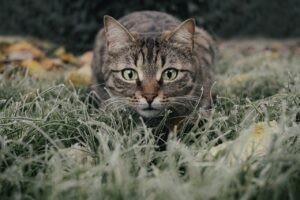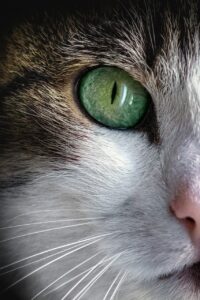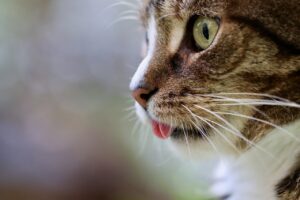Introduction
Welcome to the ultimate guide on providing the best diet for your Abyssinian Calico cat. Understanding the nutritional needs of your feline companion is crucial for their overall health and well-being. Cats, like Abyssinian Calicos, are obligate carnivores, meaning they require a diet primarily composed of animal-based proteins to thrive. This guide aims to provide you with comprehensive insights into the dietary requirements specific to Abyssinian Calico cats and how to ensure they receive the optimal nutrition they need to lead healthy and fulfilling lives.
Understanding Abyssinian Calico Cats
1. Breed Characteristics
Abyssinian Calico cats are a unique and captivating breed known for their striking coat patterns and vibrant personalities. These cats typically have a lean and muscular build, with agile bodies that reflect their active nature. Their coats exhibit a delightful blend of colors, including red, orange, black, and white, arranged in distinctive patterns that make each Abyssinian Calico cat truly one-of-a-kind. Beyond their physical appearance, Abyssinian Calicos are known for their playful and affectionate dispositions, often forming strong bonds with their human companions.
Due to their active nature, Abyssinian Calico cats require diets that support their energy levels and promote overall well-being. Providing a balanced diet rich in high-quality proteins, essential fatty acids, vitamins, and minerals is essential for maintaining their health and vitality. Understanding the unique characteristics of the Abyssinian Calico breed is crucial for tailoring their diet to meet their specific nutritional needs and ensuring they lead happy and healthy lives.
2. Caloric Requirements
Caloric needs vary among Abyssinian Calico cats based on factors such as age, weight, activity level, and overall health status. Kittens and young adults generally have higher energy requirements to support growth and development, while senior cats may require fewer calories to maintain a healthy weight and lifestyle. It’s essential to monitor your cat’s body condition and adjust their caloric intake accordingly to prevent obesity or malnutrition.
Abyssinian Calico cats with higher activity levels, such as those who enjoy regular play sessions or outdoor exploration, may require more calories to fuel their active lifestyles. On the other hand, cats with lower activity levels or those who are older or less active may require fewer calories to maintain a healthy weight. Consulting with your veterinarian can help determine the appropriate caloric intake for your Abyssinian Calico cat based on their individual needs and lifestyle.

3. Protein Needs
Protein is a vital macronutrient for Abyssinian Calico cats, as it provides the essential amino acids necessary for various physiological functions, including muscle growth, repair, and maintenance. As obligate carnivores, cats have a higher protein requirement than many other animals, making it essential to prioritize protein-rich foods in their diet. High-quality animal-based protein sources, such as chicken, turkey, beef, and fish, are ideal for meeting the protein needs of Abyssinian Calico cats.
When selecting cat food for your Abyssinian Calico, it’s essential to choose products that list a high-quality protein source as the primary ingredient. Avoid foods containing excessive fillers, by-products, or artificial additives, as these may provide less digestible protein and lower nutritional value. Providing your cat with a balanced diet rich in high-quality protein sources will help support their muscle health, immune function, and overall well-being.
4. Fat Content
Fats are a concentrated source of energy and essential nutrients for Abyssinian Calico cats. In addition to providing energy, dietary fats play a crucial role in maintaining healthy skin and coat, supporting cellular function, and aiding in the absorption of fat-soluble vitamins. When choosing cat food for your Abyssinian Calico, opt for products that contain moderate levels of healthy fats from sources such as chicken fat, salmon oil, and flaxseed oil.
While fat is an essential component of your cat’s diet, it’s important to avoid excessive fat intake, as it can contribute to obesity and related health issues. Aim for a fat content of around 15-20% of the total caloric intake in your cat’s diet, ensuring a balance between energy needs and overall health. Providing your Abyssinian Calico with a diet containing the right balance of fats will help promote healthy skin and coat, support immune function, and maintain overall well-being.
5. Carbohydrate Considerations
While cats are obligate carnivores and primarily rely on protein and fat for energy, small amounts of carbohydrates can be included in their diet to provide additional energy and essential nutrients. However, it’s essential to choose carbohydrates sources that are highly digestible and nutrient-rich to support your Abyssinian Calico’s health and well-being. Complex carbohydrates such as sweet potatoes, peas, and lentils are excellent options for providing your cat with energy and essential nutrients without causing spikes in blood sugar levels.
When selecting cat food for your Abyssinian Calico, opt for products that contain limited amounts of carbohydrates and prioritize high-quality protein and fat sources. Avoid foods containing excessive amounts of grains or fillers, as these may contribute to digestive upset or other health issues. By choosing cat food with the right balance of protein, fat, and carbohydrates, you can ensure that your Abyssinian Calico receives the optimal nutrition they need to thrive.
Choosing the Right Diet
6. Commercial Cat Food
Commercial cat food offers a convenient and balanced option for feeding your Abyssinian Calico cat. Available in various formulations, including dry kibble, wet food, and semi-moist options, commercial cat food provides a complete and balanced nutrition profile for cats of all ages and life stages. When selecting commercial cat food for your Abyssinian Calico, look for products that are specifically formulated to meet the nutritional needs of cats and contain high-quality ingredients.
When choosing commercial cat food for your Abyssinian Calico, consider factors such as your cat’s age, activity level, and any specific dietary requirements or preferences they may have. Look for products that list a high-quality protein source as the primary ingredient, with minimal fillers, by-products, or artificial additives. By selecting high-quality commercial cat food for your Abyssinian Calico, you can ensure that they receive the essential nutrients they need to thrive and maintain optimal health.

7. Raw Food Diet
Some cat owners opt to feed their Abyssinian Calico cats a raw food diet, consisting of uncooked meat, bones, and organs. Proponents of raw feeding argue that it closely mimics the diet of wild cats and provides optimal nutrition for domestic cats. Raw food diets typically contain a variety of protein sources, including muscle meat, bones, and organs, providing essential nutrients such as amino acids, vitamins, and minerals.
However, it’s essential to approach raw feeding with caution, as there are potential risks and challenges associated with this diet. Raw food diets may be more prone to bacterial
contamination, such as Salmonella or E. coli, which can pose risks to both cats and their owners. Additionally, raw diets may be more difficult to balance nutritionally, increasing the risk of nutrient deficiencies or imbalances.
8. Homemade Cat Food
Preparing homemade cat food allows you to have complete control over the ingredients and quality of your Abyssinian Calico cat’s diet. Homemade cat food recipes typically include a combination of protein sources, such as chicken, beef, or fish, along with vegetables, grains, and supplements to ensure a balanced nutritional profile. By preparing homemade cat food, you can tailor your cat’s diet to meet their specific dietary needs and preferences.
When preparing homemade cat food for your Abyssinian Calico, it’s essential to follow veterinary-approved recipes and guidelines to ensure that your cat receives all the essential nutrients they need to thrive. Homemade cat food should contain a balance of protein, fat, carbohydrates, vitamins, and minerals to support your cat’s overall health and well-being. By preparing homemade cat food with care and attention to nutritional balance, you can provide your Abyssinian Calico with a healthy and delicious diet that meets their unique nutritional needs.
Special Considerations
9. Age-Specific Nutrition
As Abyssinian Calico cats age, their nutritional needs may change, requiring adjustments to their diet to support their health and well-being. Kittens have higher energy and nutrient requirements to support growth and development, while adult cats require a balanced diet to maintain optimal health and body condition. Senior cats may benefit from diets that are lower in calories and fat to prevent obesity and age-related health issues.
When considering age-specific nutrition for your Abyssinian Calico, it’s essential to consult with your veterinarian to determine the appropriate diet for your cat’s life stage. Your veterinarian can provide guidance on selecting the right commercial cat food or homemade diet to meet your cat’s changing nutritional needs as they age. By providing age-appropriate nutrition, you can help ensure that your Abyssinian Calico enjoys a long and healthy life.
10. Health Conditions
Certain health conditions, such as allergies, urinary tract issues, or obesity, may necessitate specific dietary modifications for Abyssinian Calico cats. For example, cats with food allergies may require hypoallergenic diets free from common allergens such as chicken, beef, or grains. Cats with urinary tract issues may benefit from diets formulated to promote urinary health, such as those with controlled mineral content or added moisture.
When addressing health conditions with dietary modifications, it’s essential to work closely with your veterinarian to develop a comprehensive treatment plan tailored to your cat’s specific needs. Your veterinarian can recommend appropriate dietary changes, supplements, or medications to manage your Abyssinian Calico’s health condition effectively. By addressing health conditions with targeted dietary interventions, you can help improve your cat’s quality of life and overall well-being.
11. Food Allergies and Sensitivities
Identifying and managing food allergies and sensitivities is essential for maintaining your Abyssinian Calico cat’s health and well-being. Common food allergens in cats include beef, dairy, fish, and grains, which can cause allergic reactions such as itching, gastrointestinal upset, or skin inflammation. If you suspect that your Abyssinian Calico may have a food allergy or sensitivity, consult with your veterinarian to determine the underlying cause and implement an appropriate dietary plan.
When managing food allergies and sensitivities, your veterinarian may recommend a hypoallergenic diet that contains novel protein and carbohydrate sources that your cat has not been exposed to before. Hypoallergenic diets are designed to minimize the risk of allergic reactions and provide essential nutrients for your cat’s health and well-being. By identifying and avoiding potential food allergens, you can help ensure that your Abyssinian Calico enjoys a comfortable and symptom-free life.
12. Hydration
Ensuring proper hydration is essential for maintaining your Abyssinian Calico cat’s urinary tract health and overall well-being. Cats have a low thirst drive compared to other animals, making it essential to encourage adequate water intake to prevent dehydration. Providing your cat with a clean, fresh water source at all times is crucial for promoting hydration and supporting urinary tract health.
In addition to providing fresh water, incorporating wet food into your Abyssinian Calico’s diet can help increase their moisture intake and support hydration. Wet cat food has a higher moisture content than dry kibble, making it an excellent option for cats who may not drink enough water on their own. Offering a combination of wet and dry cat food can help ensure that your Abyssinian Calico receives adequate hydration to maintain their health and well-being.
Implementing Dietary Changes
13. Gradual Transition
When introducing a new diet to your Abyssinian Calico cat, it’s essential to do so gradually to prevent digestive upset. Abrupt changes in diet can lead to gastrointestinal disturbances such as vomiting or diarrhea, which can be stressful for your cat and disrupt their eating habits. To minimize the risk of digestive upset, gradually transition your cat from their current diet to the new diet over the course of several days to weeks.
Start by mixing small amounts of the new food with your cat’s current diet, gradually increasing the proportion of the new food while decreasing the amount of the old food. Monitor your cat’s appetite, stool quality, and overall well-being during the transition period, adjusting the transition rate as needed based on their response. By introducing new foods gradually, you can help ensure a smooth transition and minimize the risk of digestive upset for your Abyssinian Calico cat.

14. Monitoring and Adjustments
Regularly monitoring your Abyssinian Calico cat’s weight, body condition, and overall health is essential for ensuring they thrive on their new diet. Keep track of your cat’s body weight and body condition score to ensure they maintain a healthy weight and body condition. If you notice any changes in your cat’s appetite, energy levels, or behavior, consult with your veterinarian to determine the underlying cause and make any necessary adjustments to their diet or feeding routine.
Your veterinarian can provide guidance on adjusting portion sizes, selecting appropriate cat food formulas, and addressing any nutritional deficiencies or imbalances. By staying proactive and attentive to your Abyssinian Calico cat’s dietary needs, you can help ensure they receive the best possible nutrition for optimal health and well-being. Regular veterinary check-ups can also help identify any potential health issues early on, allowing for prompt intervention and treatment.
Conclusion
Providing the best diet for your Abyssinian Calico cat is essential for their long-term health and happiness. By understanding their unique nutritional needs and selecting appropriate dietary options, you can ensure that your feline companion enjoys a life of vitality and well-being. Whether you choose commercial cat food, a raw food diet, or homemade meals, prioritize quality ingredients and balanced nutrition to support your cat’s overall health and well-being. By prioritizing your Abyssinian Calico’s nutritional needs and making informed dietary choices, you can help them live a happy, healthy
, and fulfilling life.